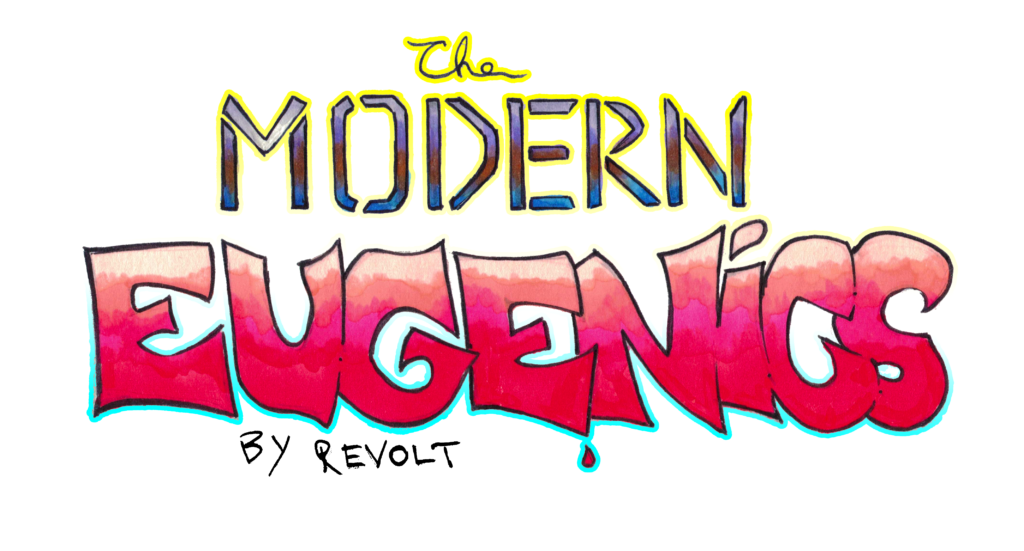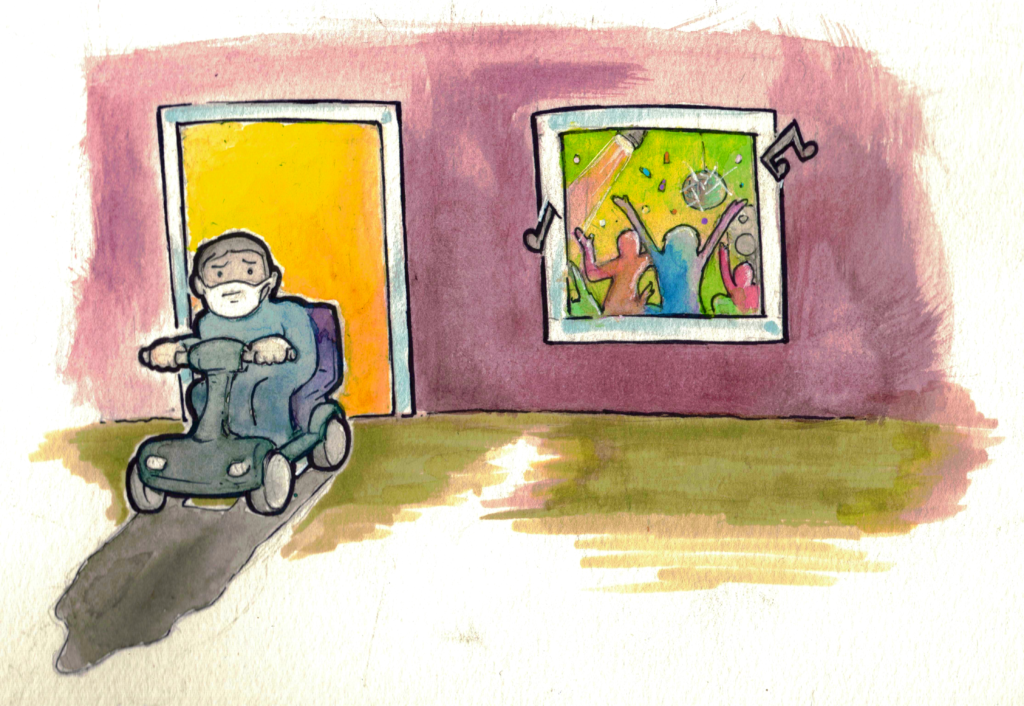
by Revolt
“If this pandemic has taught me anything, it’s that it’s not safe to talk about it.”
I found myself writing these words to a burgeoning “COVID-conscious” friend group this week, feeling the gut-wrenching pain of yet another loss of community. In a time when the country has decided to somehow “move on” from a rampant virus that still kills and hospitalizes Americans in droves, it’s hard to feel like reality has any basis in the rational. At the time of this writing, 3,272 people are being hospitalized and 358 people are dying in America from complications due to COVID-19 every day.
From threatening the man who fought to stymie the spread of this infectious disease to keep us safe, to a comedy sketch on Saturday Night Live calling the infection a “10 Day Vacation”, to comedians like Trevor Noah quipping about Omicron as the “I don’t give a sh*t about any of this anymore” strain, to even the President of the United States declaring he pandemic is over”– it’s hard to feel like I’m living in the same world as my peers, or that medical science has any bearing at all in the world.

When will it stop, I wonder? When will COVID-19 apartheid be over?
Yes, I’m disabled. I’m not scared of dying from COVID-19, but I am scared of yet another disability robbing me of my “quality of life”: Y’know, that nebulous concept that loosely translates to “not spending your days in agony.”
“Disability” is a dirty word today, though, and in order to avoid uncomfortable realities, our leaders have concocted exciting new alternatives (note the sarcasm…). We now call it “comorbidities.” You’re more likely to die of SARS2-Covid-19 if you have multiple “comorbidities.”
What the hell is a comorbidity, anyway? Something to do with a dark sense of humor? Vampires? Cohabitating with dead people?
No, it means “disabilities,” or “disabling health conditions.”
We also now have the phrase “long COVID.” What the heck is long COVID? Do we call it long diabetes? Long cancer? Long Lyme disease?
We have words for this stuff. It’s called being disabled. Chronically, seriously, permanently disabled. And it sucks.
I’ve lived with chronic, serious, permanent disability for many years now. Let me tell you, you don’t want this. Permanent disability is a great way to lose your community, your life partner, your job. There is a reason why more than 3,000 of San Francisco’s homeless population report living with a disability. However, no amount of disturbing facts of chronic disability from COVID-19 seem to budge us from our collective disassociation from the “‘Rona”. UCLA conservatively estimates that due to this pandemic “…there could possibly be 2.8 million Americans who are in it for the long haul, with long-term temporary disabilities if not lifelong disabilities.” 2.8 Million is a lot of people.
But according to the director of the Centers for Disease Control, it’s encouraging news that we are sick or dying.
There is a word for this surreal, daily nightmare, in which people at the grocery store yell in my face for keeping three feet away from them at checkout. In which friend after friend disappears from my world because I cannot regularly text and I want to socialize while masking. In which social programs are repeatedly cut, or threatened to be outright eviscerated if a certain political party takes power again.
We have words for this stuff. It’s called eugenics. Eugenics is the belief in a false so-called scientific superiority of one kind of human over another; it’s the practice of atomizing and subdividing the human race into desirable and less desirable categories. It’s one of the most common tools for genocide and the erasure of cultures and peoples, especially during times of “peace.”
Historically—just like today—eugenics was normalized in the United States and used to serve political ends, especially in the South. It was especially popular in the 19th century for developing a moral and scientific excuse to perpetuate the barbarism of slavery and the disenfranchisement of Black Americans. Developed by racist scumbag scientists, many of whom were the tops in their respective fields (like “eminent” scientist from Harvard, Louis Agassiz), they argued for polygenism, the idea that the races of humans were in fact distinct species, many with lower intelligence, more susceptibility to disease, etc.
Guess which race was always on the top of this hierarchy and which race was always on the bottom? Yeah, white supremacy looks the same in all ages and places. It must have been a real shock to these deplorable sadists when Frederick Douglass became one of the most articulate and influential speechwriters in American history, even after being born into slavery.
Eugenics was also very popular into the early 20th century with forced sterilizations (a nice word for violently surgically altering a person’s reproductive functions without their consent) of black women. Later, eugenics turned up in the wackjob anti-Jewish theories of our favorite bunker suicide fascist, Adolf Hitler.
Eugenics has a long and ugly history, affecting and terrorizing people with disabilities of all races and genders. It is used by Mayor London Breed and her administration to forcibly incarcerate and remove the rights of free citizens who are homeless with psychological disabilities. They call it “involuntary residential treatment” and “conservatorship”; y’know, the fun fun thing Brittany Spears went through (sarcasm). Even today, it remains legal in 31 states (including California) to forcibly sterilize people with mental disabilities against their will.
Eugenics and the killing of Black and disabled babies through sterilizations never seems to register as a concern for the so-called “pro-lifers.” But I digress.
During these times of moral and political crisis, old debunked and horrible ideas have been returning to the fore. From universities that offer speaking engagements to their worst proliferators, to the completely unaccountable Big Tech companies that allow the spread of conspiracy theories, these archaic and dangerous philosophies have nestled into the craniums of would-be honest, moral, and compassionate citizens. A big thanks to politicians for doing their part in keeping social media companies unchecked (more sarcasm).
Sardonic joking aside, living through this nightmare is something else. Not a day goes by that I’m not reminded that many would prefer that I were exterminated; that they believe my community and I are such an intolerable hindrance, so unnecessarily deserving of life and freedom.
And whose freedom do we speak of these days? The freedom to infect. The freedom to be mask-less, vaccine-less (if only these people would extend their belief system to clothes-less, we might have more cool nude beaches again!) These are the same people who gave us the first polio case (a completely preventable disease) in nearly a decade.
Even the suggestion of wearing an N95 mask or hosting an event virtually is met with immediate pushback, open hostility, ghosting, protesting, and even violent vigilante-ism.
“Now people realize we can do things differently.”
This was a common phrase friends told me during the course of the pandemic, trying to comfort me with the thought that virtual meetings and hangouts would become a regular occurance from now on for people like me.
“Sorry to say, the ableists will get rid of it; it will go back.” I would tell them, knowing the extent of this country’s ableism and hatred for my kind.
What I didn’t expect, though, was how dangerous it would become to speak up. I’ve always spoken my mind, unless I have been too physically tired or sick to do so. But now, it has become a strategy for survival to stay silent. Every conversation about masking puts me at risk of a further destroyed support system: another ghosting friend, another dissolving community (or one I can’t access), another quitting care provider. I simply can’t afford it, and so I continue to shut myself in, away from society.
I’m lucky enough to have a roof over my head that allows me to do that, whereas disabled homeless people are at the continual mercy of this disease every day.
I’m deathly afraid of the smallest errands I run, moving around the grocery store with a laminated sign on the back of my wheelchair that reads “I’m high-risk for Covid-19, please allow some distance, thank you <3” (which is constantly ignored). I’m deathly afraid of losing all of my community and friends, who no longer have any interest in phone calls or virtual meetings. And I’m deathly afraid of social assistance programs crumbling under the weight of increased policing budgets and a city politic looking more like Texas every day.
Dr. Dwinita Mosby Tyler gave an eye-opening speech about diversity fatigue, and how minority populations are tired of fighting for justice. We’re beat, worn out, and more than that, we are terrified for our lives. “What if white people led the charge against racism?” she posits.
I’d like to ask, “What if non-disabled people led the charge against eugenics?” Truth be told, I won’t be able to publish words like this for much longer if they don’t.
Maybe that’s a good thing for some people. Maybe they would rather my kind be exterminated so they don’t have to be faced with uncomfortable truths. But I believe most human beings are moral beings. I believe we all desire to experience happiness and compassion, that our hearts and ideas flourish in the levity of tolerance and diversity rather than under the consternation and paranoia of bigotry and policing.
“Love thy neighbor” doesn’t have to be a commandment; I think it’s something that human beings simply do by default if left to their common senses and goodwill, without coercion and manipulation. In the words of President Joe Biden, “And if we all do our duty—if we do our duty in 2022 and beyond, then ages still to come will say we … heeded not our worst instincts but our better angels.”
Eugenics are our worst instincts, so who are your better angels today?

